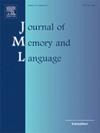The role of memory and instruction in the acquisition of vocabulary and grammar: An aptitude–treatment interaction study
IF 3
1区 心理学
Q1 LINGUISTICS
引用次数: 0
Abstract
Individual differences in cognitive abilities and explicit instruction can affect language learning. Understanding how individual differences and instruction interact, however, requires us to determine the points in the language learning process that are open to influence. One hundred and eleven adults were exposed to an artificial language comprising transitive sentences occurring with action scenes and were either instructed or not in the language structure. Learning proceeded by determining the cross-situational correspondences between words and scene features. We found that declarative memory ability related strongly and positively but procedural memory related weakly and negatively to overall immediate learning. Rule-search instruction also positively influenced short-term learning, but not of the structure that was explicitly highlighted, and this was most pronounced in those with high declarative memory. The results highlight which features of language learning are accessible to information about language structure, and how that is affected by the learners’ cognitive abilities, with practical implications for personalised design of language learning programmes.
记忆和教学在词汇和语法习得中的作用:一项能力-处理的互动研究
认知能力和显性指导的个体差异会影响语言学习。然而,要理解个体差异和教学如何相互作用,就需要我们确定语言学习过程中容易受到影响的点。111名成年人被暴露在一种由动作场景中及物句组成的人工语言中,他们要么接受语言结构的指导,要么不接受指导。学习通过确定单词和场景特征之间的跨情境对应关系进行。我们发现陈述性记忆能力与整体的即时学习有显著的正相关,而程序性记忆能力与整体的即时学习有微弱的负相关。规则搜索指导对短期学习也有积极的影响,但不是明确强调的结构,这在具有高陈述性记忆的人身上表现得最为明显。研究结果强调了语言学习的哪些特征是可以获得语言结构信息的,以及学习者的认知能力是如何影响这些特征的,这对语言学习计划的个性化设计具有实际意义。
本文章由计算机程序翻译,如有差异,请以英文原文为准。
求助全文
约1分钟内获得全文
求助全文
来源期刊
CiteScore
8.70
自引率
14.00%
发文量
49
审稿时长
12.7 weeks
期刊介绍:
Articles in the Journal of Memory and Language contribute to the formulation of scientific issues and theories in the areas of memory, language comprehension and production, and cognitive processes. Special emphasis is given to research articles that provide new theoretical insights based on a carefully laid empirical foundation. The journal generally favors articles that provide multiple experiments. In addition, significant theoretical papers without new experimental findings may be published.
The Journal of Memory and Language is a valuable tool for cognitive scientists, including psychologists, linguists, and others interested in memory and learning, language, reading, and speech.
Research Areas include:
• Topics that illuminate aspects of memory or language processing
• Linguistics
• Neuropsychology.

 求助内容:
求助内容: 应助结果提醒方式:
应助结果提醒方式:


